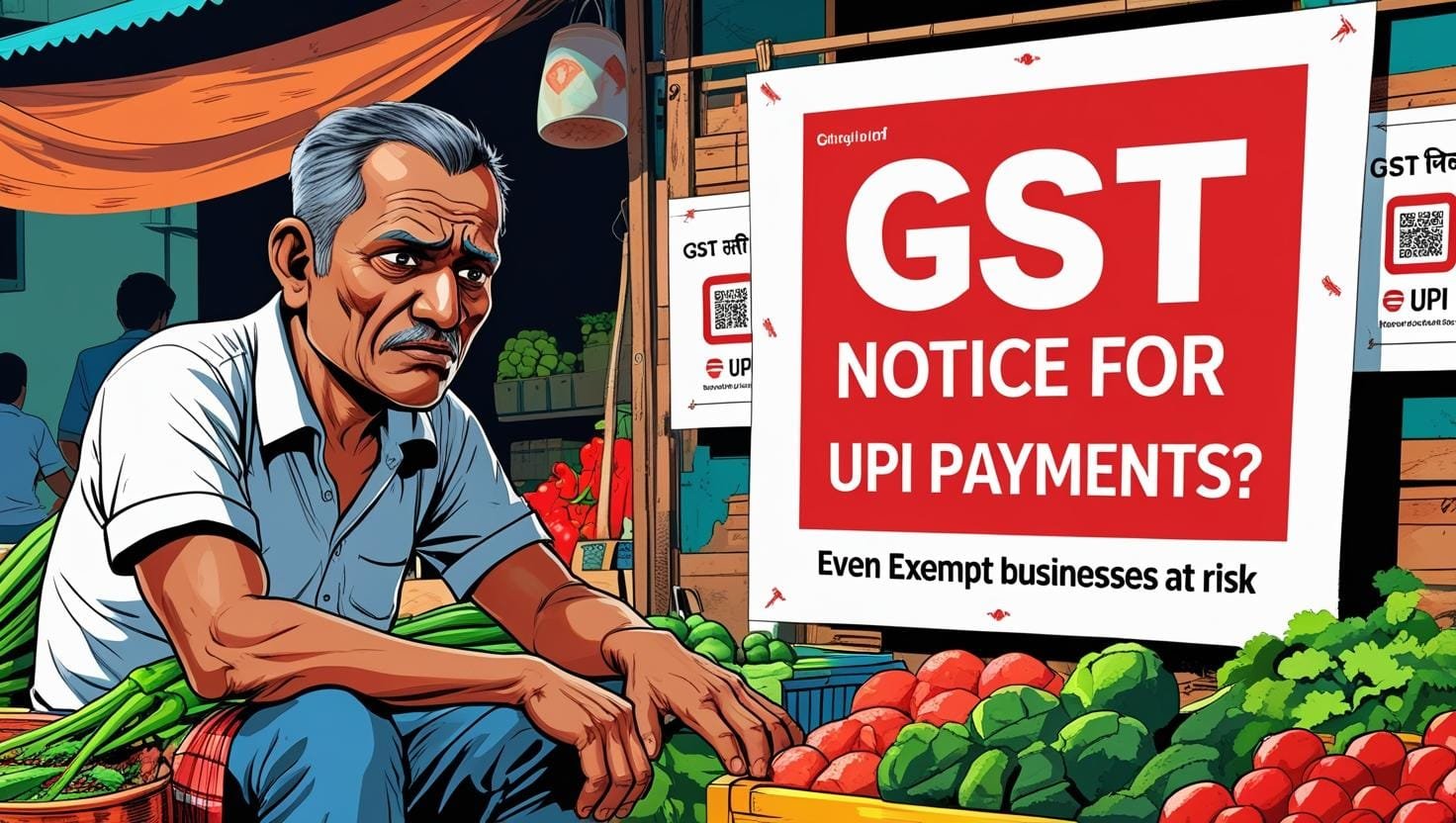GST Notice of ₹29 Lakh to Karnataka Vendor: A Wake-Up Call for Small UPI Users
Digital India is transforming how even the smallest vendors do business. From vegetable sellers to chaiwalas, more and more Indians are using UPI and digital wallets to accept payments. But a recent case from Haveri, Karnataka, has sparked concerns among small traders and daily wage earners.
A simple vegetable vendor named Shankargouda Hadimani received a GST notice worth ₹29 lakh, despite dealing only in GST-exempt goods. This story is more than just one man’s experience — it’s a warning about how digital footprints can attract tax scrutiny, even for the smallest business owners.
🧾 What Happened?
Shankargouda Hadimani runs a vegetable stall outside a school in Haveri. Like many other small vendors, he embraced digital payments. Most of his customers paid using UPI apps like PhonePe, Google Pay, and Paytm.
This convenience, however, created a trail of digital transactions that totalled ₹1.63 crore over four years. While he believed he was just running a small, cash-light business, this volume of transactions triggered the GST Department’s attention.
✅ Important Fact:
Vegetables and fresh produce are exempt from GST under the law. So, in theory, he should not be liable to pay any GST on his sales.
📩 Why Did He Receive the ₹29 Lakh GST Notice?
According to reports, the GST authorities issued a notice after analyzing his bank and UPI records. The reason was simple: even though the goods were tax-exempt, the scale of income appearing in digital mode raised red flags.
This is due to the automated data matching systems in the GST portal that flag high transaction volumes without differentiating between taxable and exempt income.
It’s likely that:
The system assumed the turnover was from taxable goods.
The vendor had not filed any GST returns or registered under the GST regime.
Authorities acted on mismatches between income and compliance data.
🔍 Expert View: What Are the Rules?
GST on Exempt Goods:
Items like fresh vegetables, fruits, milk, bread, etc. are exempt from GST under Notification No. 2/2017-Central Tax (Rate).
Vendors dealing exclusively in exempt goods are not required to register for GST, even if turnover exceeds ₹20 lakh.
However, digital payments create a clear record, and if you don’t have proper documentation to explain your business, you may face scrutiny.
When Can GST Dept Issue Notices?
If total digital credits seem high but no GST return is filed.
If AIS or TIS data shows inconsistencies.
If PAN-linked bank accounts show high credits without corresponding GST registration.
⚠️ What This Means for Small Businesses
This case raises serious concerns for small sellers:
UPI makes income transparent and traceable.
No GST registration or filing could invite notices, even for exempt businesses.
Tax departments may assume non-compliance if no proper communication is done.
Even honest, law-abiding vendors can face pressure if they don’t maintain records, invoices, or a proper explanation of their business.
📌 What You Should Do if You’re a Small Vendor Accepting UPI
Here are a few simple tips to avoid tax trouble:
✅ 1. Keep Records
Maintain a simple register or digital spreadsheet of your daily sales — include item details and whether it is taxable or exempt.
✅ 2. Don’t Ignore Notices
If you receive any notice, respond on time. Consult a tax expert or CA to draft a suitable reply.
✅ 3. File Voluntary Declaration
If needed, submit a voluntary declaration about the nature of your goods (exempt) and the reason for not registering under GST.
✅ 4. Consult Before Crosses ₹20 Lakh
If your turnover is nearing the GST threshold, speak to a tax advisor. It’s better to register voluntarily than face legal penalties.
✅ 5. Link PAN and Aadhaar Properly
Ensure your PAN and Aadhaar are linked and correct across GST portal, bank, and UPI.
👨🏫 Conclusion: A Lesson in Awareness
Shankargouda’s case is not just about one vendor — it’s a learning moment for lakhs of small traders across India. In the age of UPI and AI-based tax surveillance, even exempt income needs to be documented.
Digital India is empowering citizens, but with that comes financial and tax responsibility. Small sellers must now take steps to protect themselves from unintended tax notices.
If you’re unsure about your GST obligations, it’s best to consult with a qualified tax expert or CA.
GST notice to small vendor, UPI transactions and GST, digital payments GST rules, GST exempt items list, GST registration for vegetable vendors, GST turnover limit India, GST on UPI payments, income tax UPI tracking, GST for small business, how to avoid GST notice


